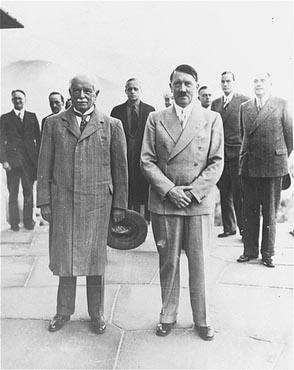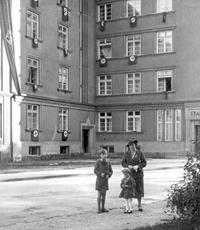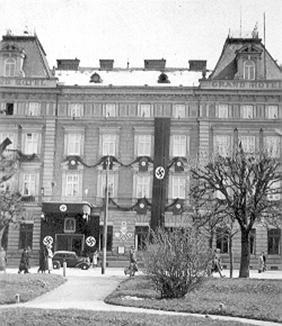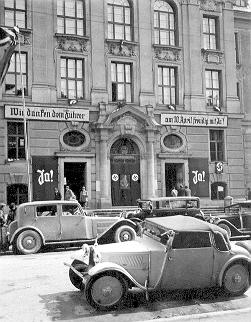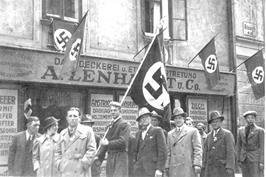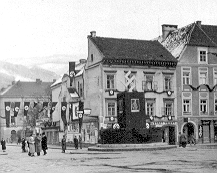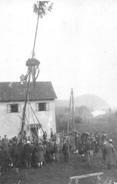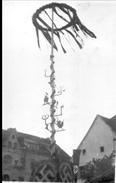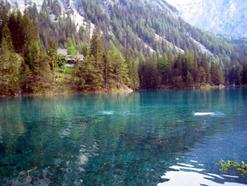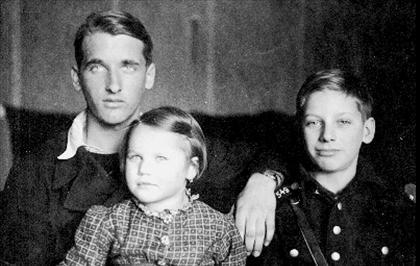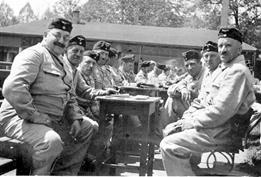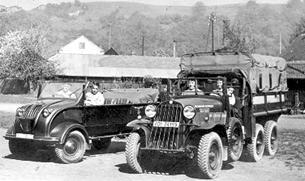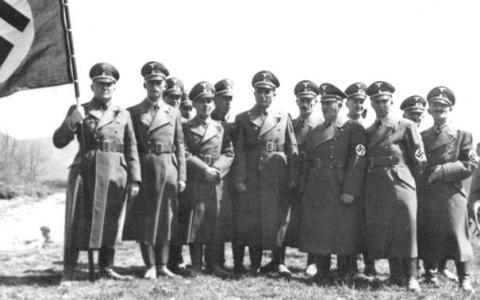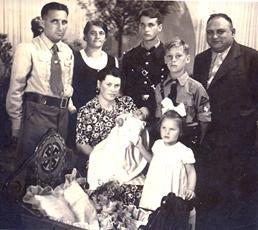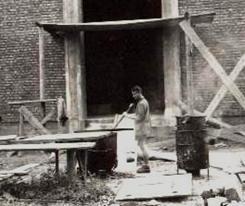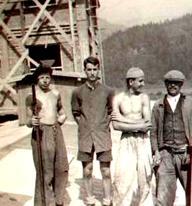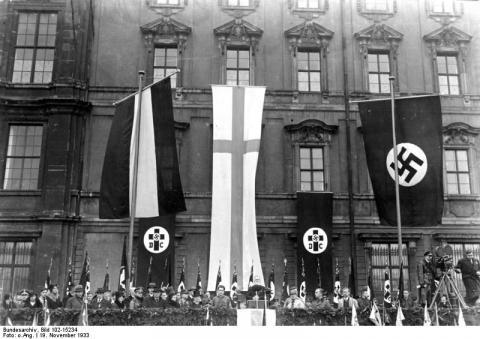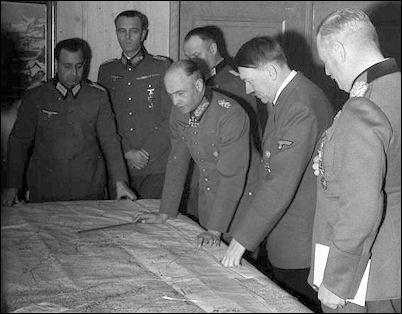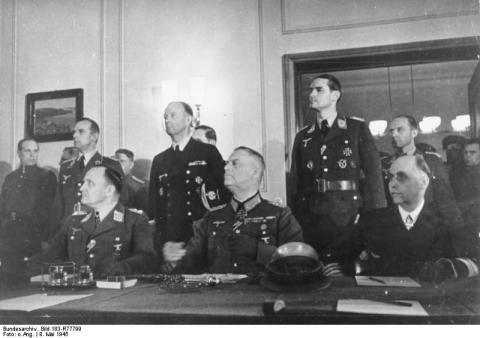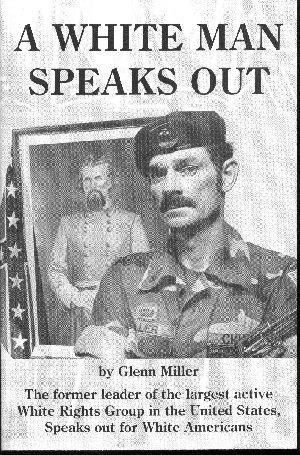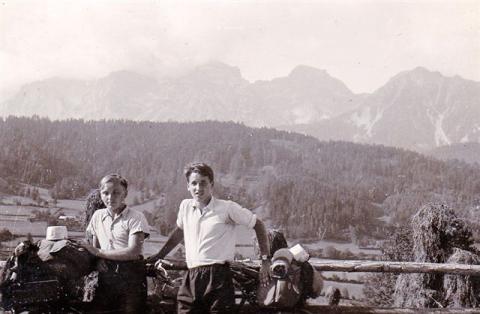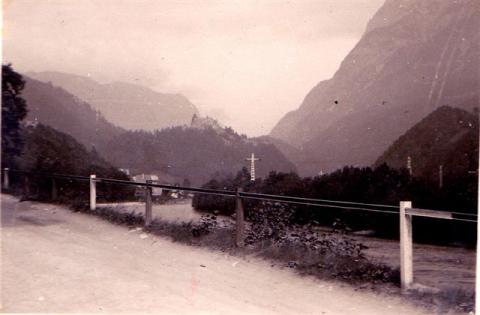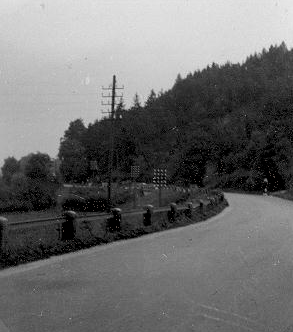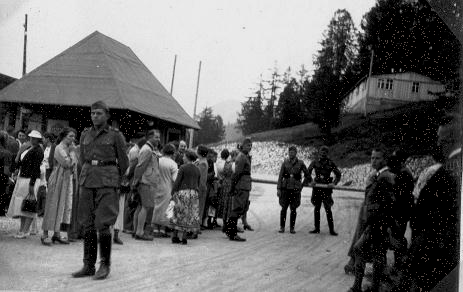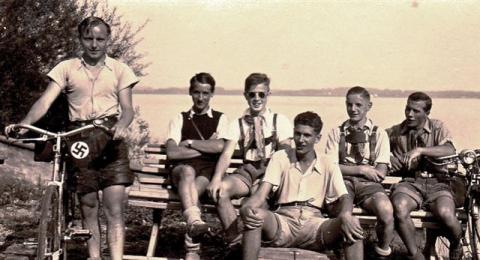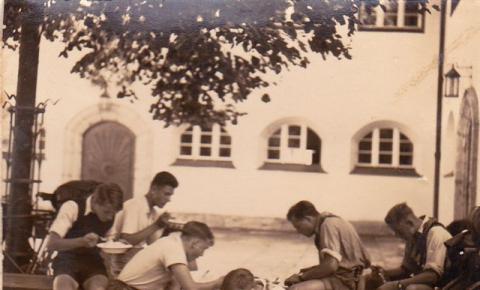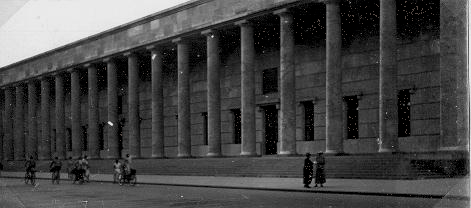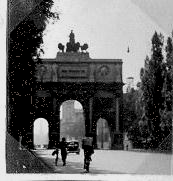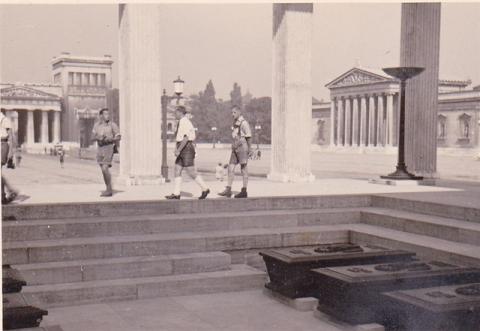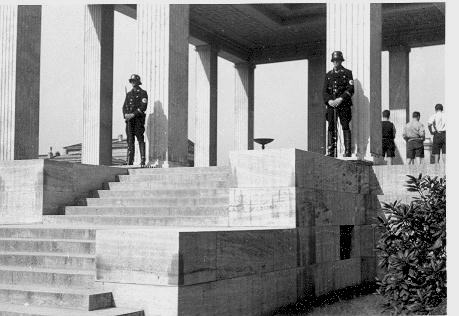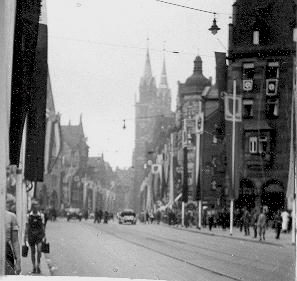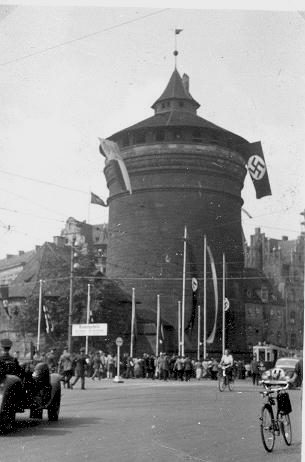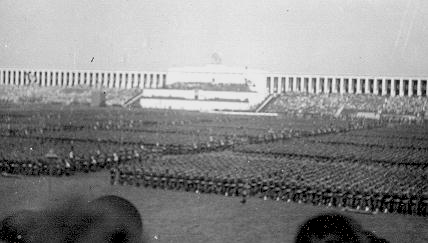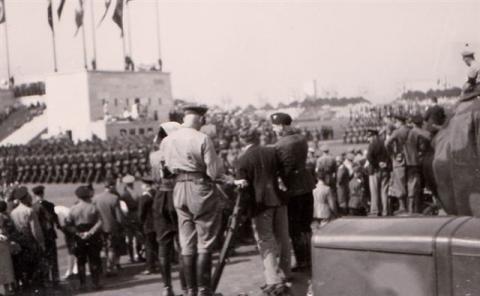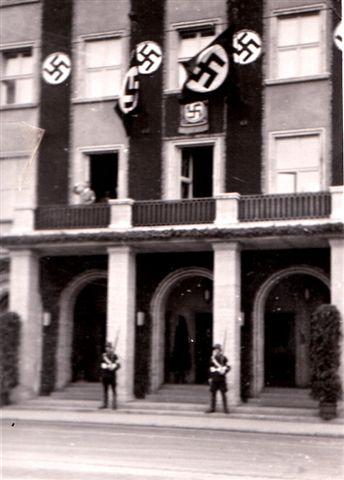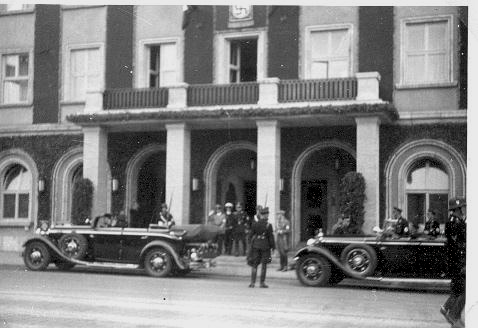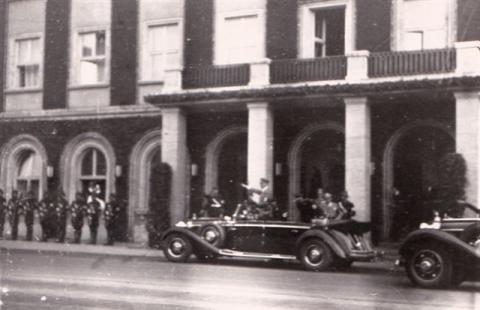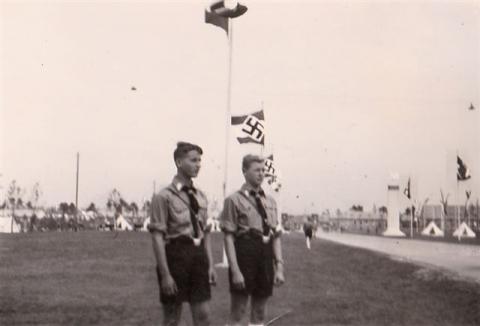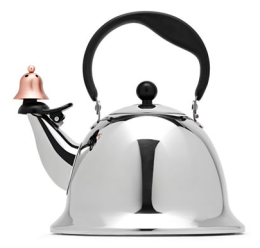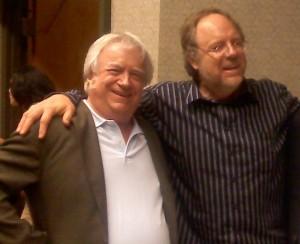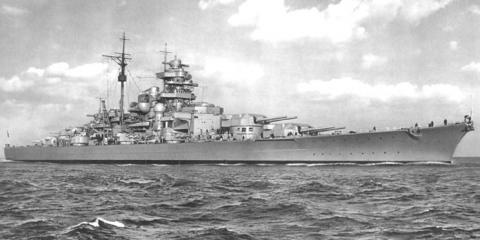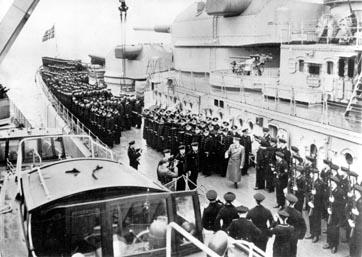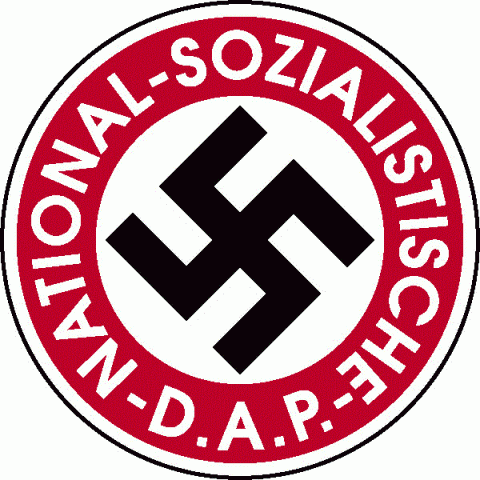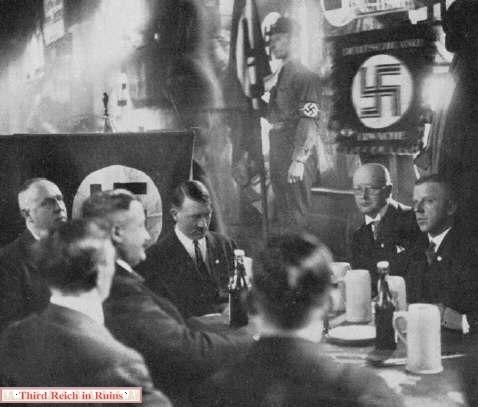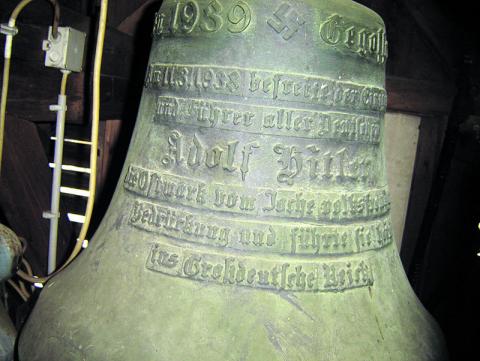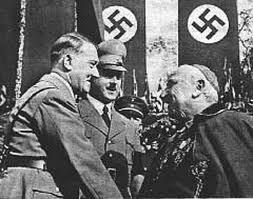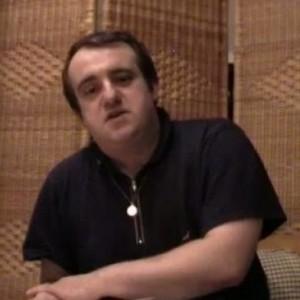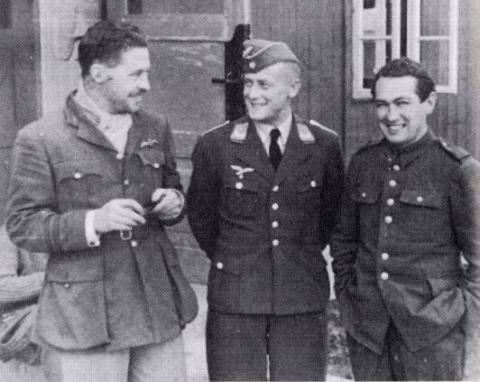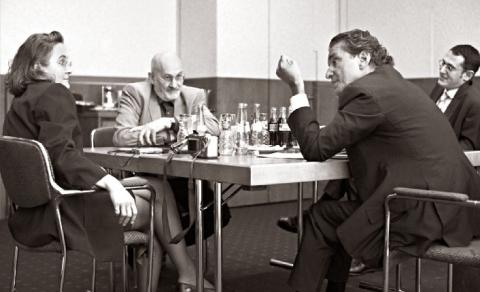National Socialist German Workers Party
Public meeting in the Great Hall of the Hofbräuhaus
Friday 15 August 1920
Adolf Hitler
~~Why We Are Antisemites~~
My dear countrymen and women! We are quite used to being generally referred to as monsters. And we are considered particularly monstrous because, in a question that certain gentlemen in Germany are nervous about, we are marching at the head – namely in the question of the opposition to the Jews.
Our people understand many things but this one problem nobody wants to understand, and in particular because, as a worker explained: “What connection is there at all between the workers and the Jewish Problem, when in reality most of the people have no idea what this problem means.” Most people let themselves be guided by feelings and say: “I have seen good and bad people among them, just like among ourselves.”
Very few have learned to view the problem free of emotion, in its clean form. I will at once begin with the word “work”.
What does it mean – work?
Work is an activity performed not of one’s free will, but for the sake of one’s fellowmen. If there is a difference between man and animals, so it is particularly regarding work, which does not originate in an instinct but comes from an understanding of a necessity. Hardly any revolution had so deep an effect as the slow one which gradually transformed the lazy man of primeval time into the man who works.
Talking of work, we can assume that this activity followed these three phases:
First, it was an effect of a simple instinct of self-preservation which we also see in animals. Later, it developed into the second form of work – the one from pure egoism. Also this form became gradually replaced by the third: Work out of ethical sense of duty, where an individual does not work because he is forced to it. We see it at every turn. Millions of people work without being constantly forced to it. Thousands of intellectuals are sometimes bound to their studies for whole nights on end, day after day, although they may not do it for material gains. The hundreds of thousands of German workers after the end of their work tend their gardens. And, generally, we see today that millions of people cannot imagine living without some sort of occupation.
When I said that this process represents a slow but perhaps also the greatest of all revolutions in human history, then one must assume that also this revolution had to have a cause, and this cause was the greatest Goddess of this Earth, the one who is able to whip men to the uttermost – the Goddess of Hardship.
We can see this hardship in early prehistory, above all in the northern part of the world, in those enormous ice deserts where only the meagrest existence was possible. Here, men were forced to fight for their existence, for things which were, in the smiling South, available without work, and in abundance. In those times man made perhaps his first groundbreaking discovery: In those cold stretches man was forced to find a substitute for the only gift of Heaven which makes life possible – the Sun. And the man who produced the first artificial sparks later appeared to Humanity as a god – Prometheus, the fire-bringer. The North forced men to further activity – production of clothes, building of abodes. First, it was simple caves, later huts and houses. In short, he created a principle, the principle of work. Life would not have been possible without it.
Although work was still simple, it had already to be planned beforehand and each individual knew that if he has not done his part, he will die of hunger in the coming winter. At the same time another development followed – the terrible hardship became a means for breeding of a race. Whoever was weak or sickly could not survive the terrible winter period and died prematurely. What remained was a race of strong and healthy giants. Yet another trait of this race was born. Where man is externally muzzled, where his radius of action is limited, he begins to develop internally. Externally limited, internally he becomes unlimited. The more man, due to external forces, must depend on himself, the deeper internal life he develops and the more he turns inward.
These three achievements: The recognized principle of work as a duty, the necessity, not only out of egoism but for preservation of the whole group of people – a small clan; second – the necessity of bodily health and thereby also of normal mental health; and third – the deep spiritual life. All these gave the northern races the ability to go to the world and build states.
If this power could not find its full expression in the high North, it became apparent when the ice shackles fell and man turned south to the happier, freer nature. We know that all these northern peoples had one symbol in common – the symbol of the Sun. They created cults of Light and they’ve created the symbols of the tools for making fire – the drill and the cross. You will find this cross as a Hakenkreuz as far as India and Japan, carved in the temple pillars. It is the Swastika, which was once a sign of established communities of Aryan Culture.
Those races, today called Aryans, created all the great cultures of the ancient world. We know that Egypt was brought upon its high cultural level by Aryan immigrants. Similarly, Persia and Greece; the immigrants were blond, blue eyed Aryans. And we know that outside of these Aryan states no civilized states have been founded. There emerged mixed races between the black, dark eyed and dark colored, southern races and the immigrants, but they failed to create any large, creative culture states.
Why is it that only Aryans possessed the ability to create states? It was due, almost exclusively, to their attitude toward work. Those races which, as the first, stopped seeing work as the result of coercion and saw it rather as a necessity born out of hundreds of thousands of years of hardship, had to become superior to other people. And, besides, it was work that made people come together and divide the work among them. We know that the moment the individual work to sustain oneself turned into work within communities, the community tended to assign a particular work to those particularly talented, and with increasing division of work it became necessary for still greater joining together into still bigger groups. So, it is work which created kinships at first, later tribes, and still later, led to the creation of states.
If we see, as the first prerequisite for creating states, the conception of work as social duty, so the second necessary ingredient is racial health and purity. And nothing helped the northern conquerors more against the lazy and rotten southern races than the refined strength of their race.
States would remain an empty vessel if not decorated with that which we normally call culture. If we removed everything and kept just railways, ships, etc.; if we removed everything we consider art and sciences, such a state would in reality become empty and we would understand the creative power of the northern tribes. The moment their great, inborn imagination could act in great, free areas, it created everywhere immortal works. We see this process repeated continuously even in the smallest scale. Similarly, we know that great minds are often born at the bottom of society, unable to develop there but, given an opportunity, they begin to grow and become leaders in arts, sciences, and also in politics.
We know today that there are extensive interrelations between the state, nation, culture, art and work and it would be madness to think that any of them could exist independently of the others. Let us take art – considered as an international domain – and we shall see that it is unconditionally dependent on the state. Art blossomed in those areas where the political development made it possible. The art of Greece reached its highest level when the young state had triumphed over invading Persian armies. Construction of the Acropolis began at that time. Rome became the city of art after the end of the Punic Wars, and Germany built her cathedrals, as in Worms, Speyer and Limburg, when the German Empire under Salians had achieved its greatest triumphs. We can follow this connection to our time. We know that art, for example the beauty of German towns, always depended on political development of these towns; that it was political considerations which moved Napoleon III to regulating of the Boulevards and Friedrich the Great to establishing Unter den Linden. Similarly in Munich where it was obvious that the city could not become an industrial center and so art was chosen to elevate the rank of the city, which now everyone who wants to get to know Germany must visit. Similar were the origins of today’s Wien (Vienna).
The case was similar with other arts. The moment the small, powerless statelets began to unite into one state, then also one German art, proud of itself, began to grow. The works of Richard Wagner appeared in the period when shame and powerlessness were replaced by a unified, great German Reich.
And so, not just art is dependent on the state, on the politics of the state; the same is the case with work itself because only a sound state is in the position to give the opportunity of working to its citizens and let them use their talents. The opposite is the case with the race in relation to everything else. A state with a rotten, sick and unsound race will never produce great works of art or make great politics, or at least baskin abundance. Each of these factors depends on the others. And only when all of them complement each other, can we say: There is harmony in the state, the way we Germanics understand it.
Can the Jew build a state?
Now we have to ask ourselves the question: How about the Jew as a state builder? Does the Jew possess the power to create a state? First we must examine his attitude to work, find out how he perceives the principle of work, and excuse me if I now take a book called The Bible. I am not claiming that all its contents are necessarily true, as we know that Jewry was very liberal in writing it. One thing, however, is certain: it has not been written by an antisemite. (Laughter) It is very important because no antisemite would have been able to write a more terrible indictment against the Jewish race than the Bible, the Old Testament. Let us take a look at a sentence: “By the sweat of thy brow shalt thou eat bread.” And it says that it was to be a punishment for the Fall of Man.
Ladies and Gentlemen! Already here we see that the whole world lies between us; we could never conceive of work as a punishment – otherwise we would all have been convicts. We do not want to conceive of work as punishment. I must confess: I would not have been able to exist without work, and hundreds of thousands and millions would have been able to withstand perhaps 3 or 5 days, maybe even 10, but not 90 or 100 days without any activity. If Paradise really existed, the Land of Plenty, then our people would have been unhappy in it. (Calls: Hear, hear) We Germans seek constantly a possibility to do something and if we cannot find anything, at least from time to time we hit one another in the face. (Laughter) We are unable to bear absolute rest.
Thus we see, already here, a big difference. Because a Jew has written this, true or not is unimportant because it still reflects the opinion which Jewry has about work. For them work is not an obvious ethical duty but at most a means to sustenance. In our eyes, this is not work because in this case any activity serving self-preservation, without regard to fellow men, might be called work. And we know that this work, in the past, consisted of plundering of caravans, and today in planned plundering of indebted farmers, industrialists and workers. The form has changed but the principle is the same. We do not call it work, but robbery. (Calls: Hear, hear)
When already such a basic notion separates us, here comes another. I have already explained that in the long period in the North the races became purified. This means that all the inferior and weak gradually died out and only the soundest remained. Also, here the Jew differs from us because he has not become purified but instead practiced inbreeding; he multiplied greatly but only in narrow circles, and without selection. And therefore we see a generation which is plagued by defects caused by inbreeding.
Finally, the Jew does not possess the third factor: The inner spiritual life. I do not need to explain here what a Jew generally looks like. You all know him. (Laughter) You know his constant restlessness that never gives him a possibility to concentrate and have a spiritual experience. In the most solemn moments he flickers his eyes and one can see that even during the most beautiful opera he is calculating dividends. (Laughter) The Jew has never had his own art. (Hear, hear) His own temple has been built by foreign builders: The first was the Assyrians, and for the building of the second – the Roman artists. He has not left anything which might be called art, no buildings, nothing. In music, we know that he is only able to skillfully copy the others’ art. We shall not conceal that today he has many famous conductors whose fame he can thank the well-organized Jewish Press for. (Laughter)
When a nation does not possess these three traits, it is not able to create states. And that is true because throughout centuries the Jew was always a nomad. He has never had what we might call a state. It’s a mistake which is spreading widely today to say that Jerusalem was a capital of a Jewish state of a Jewish nation. On the one side, there was always a great chasm between the tribes of Judah and Caleb and the northern Israeli tribes, and only David, for the first time, succeeded in gradually bridging the chasm through the unitary cult of Yahweh. We know precisely that this cult has at a very late time chosen for itself Jerusalem as its sole seat. Only from that moment have the Jewish people gotten a center, like Berlin or New York or Warsaw today. (Hear, hear) This was a town in which the Jew, thanks to his talents and traits, gradually achieved predominance, partly through the force of arms, partly through the “power of trombones.” Besides, the Jews, already in those times, lived as a parasite in the body of other peoples and it had to be so. Because a people which does not want to work – the often hard work of building and maintaining a state – to work in mines, factories, in construction etc.; all this was unpleasant to the Hebrew. Such a people will never establish a state but prefers to live in some other state where others work and he acts as an intermediary in business, a dealer in the best case, or in good German – a robber, a nomad who undertakes robbing raids just like in ancient times. (Lively bravo! and hand clapping)
And so we can now understand why the whole Zionist state and its establishing is nothing but a comedy. Herr Chief Rabbi has now said in Jerusalem: “Establishment of this state is not the most important; it is far from certain if it will at all be possible.” However, it is necessary that Jewry has this city as its spiritual headquarters because Jewry “materially and in fact are the masters of several states; we control them financially, economically and politically.” And so the Zionist state is going to be a harmless corn of sand in the eye. Efforts are made to explain that so and so many Jews have been found that want to go there as farmers, workers, even soldiers. (Laughter) If these people really have this urge in themselves, Germany today needs these ideal men as turf cutters and coal miners; they could take part in building our water power plants, our lakes etc. but it does not occur to them. The whole Zionist state will be nothing else than the perfect high school for their international criminals, and from there they will be directed. And every Jew will, of course, have immunity as a citizen of the Palestinian state (Laughter) and he will of course keep our citizenship. But when caught red-handed, he will not be a German Jew any longer but a citizen of Palestine. (Laughter)
One can almost say that the Jew cannot help it because everything stems from his race. He cannot do anything about it and, besides, it doesn’t matter whether he is good or bad for he must act according to the laws of his race, just as do members of our people. A Jew is everywhere a Jew; consciously or unconsciously, he resolutely represents the interests of his race.
Thus we can see the two great differences between races: Aryanism means ethical perception of work and that which we today so often hear – socialism, community spirit, common good before own good. Jewry means egoistic attitude to work and thereby mammonism and materialism, the opposite of socialism. (Hear, hear) And due to these traits, which he cannot ‘overstep’ as they are in his blood and, as he himself admits, in these traits alone lays the necessity for the Jew to behave unconditionally as a destroyer of states. He cannot do otherwise, whether he wants to or not. And thereby he is unable to create his own state because it requires a lot of social sense. He is only able to live as a parasite in the states of others. He lives as a race amongst other races, in a state within others states. And we can see very precisely that when a race does not possess certain traits which must be hereditary, it not only cannot create a state but must act as a destroyer, no matter if a given individual is good or evil.
The Jewish path of destruction
We can follow this fate of Jewry from the earliest prehistory. It is not important if there is truth in every word of the Bible. In general, it gives us at least an extract of the history of Jewry. We see how the Jews present themselves because the Jew wrote these words quite innocuously. It did not appear to him as outrageous when a race, through cunning and deceit, invaded and despoiled other races, was always finally expelled and, unoffended, sought to repeat the same elsewhere. They pimped and haggled even when it came to their ideals, always ready to offer even their own families. We know that not long ago a gentleman was staying here, Sigmund Fraenkel, who has just written that it is quite unjust to accuse Jews of a materialistic spirit. One should only look at their sunny family life. However, this intimate family life did not prevent Grandfather Abraham from pimping off his own wife to the Pharaoh of Egypt in order to be able to do business. (Laughter) As was the grandfather, so was the father and so were the sons who never neglected their business. And you can be sure that they are not neglecting the business even as we speak. Who among you was a soldier, he will remember Galicia or Poland: There, at the train stations, these Abrahams were everywhere. (Laughter and hand clapping)
They penetrated into other races for millennia. And we know very well that wherever they stayed long enough symptoms of decay appeared and the peoples could do nothing else than to liberate themselves from the uninvited guest or to disappear themselves. Heavy plagues came over the nations, no less then ten in Egypt – the same plague we experience today firsthand – and finally the Egyptians lost their patience. When the chronicler describes that the Jews were suffering when they finally left, we know differently, for as soon as they were out, they began to long after coming back. (Laughter) It seems that they did not have it so badly. On the other hand, if it’s true they had been forced to help build pyramids, it would mean today forcing them to earn their bread by working in our mines, stone quarries etc. And just as you are not going to see this race voluntarily do it, so there was nothing left to the Egyptians but to force them. What hundreds of thousands of others do as a matter of course, means for the Jew another chapter of suffering and persecution.
Still later, the Jew was able to infiltrate the then soaring Roman Empire. We can still see his traces in southern Italy. Already 250 years before Christ he was there in all places, and people began to avoid them. Already, then and there, he made the most important decision and became a trader. From numerous Roman texts we know that he traded, like today, with everything from shoelaces to girls. (Hear, hear) And we know that the danger grew, and that the insurrection after the murder of Julius Caesar was mainly fomented by the Jews.
The Jew knew even then how to make friends with the masters of the Earth. Only when they became shaky in their rule, he suddenly became a populist and discovered his wide open heart for the needs of the broad masses. So it was in Rome, as we know. We know that the Jew used Christianity, not out of love for Christ, but partly because he knew that this new religion questioned all earthly power and so it became an axe at the root of the Roman state, the state which was built on the authority of the public servant. And he became its chief bearer and propagator, without becoming a Christian – he couldn’t, he remained a Jew, precisely as today when he, never stooping to the level of worker, remains a master pretending to be a socialist. (Bravo!) He did the same 2000 years ago, and we know that this new Teaching was nothing else than a resurrection of the old truism that people in a state should have legal rights and, above all, that equal duties should give equal rights. This obvious Teaching was gradually turned against the Jew himself, as the similar Teaching of socialism has to turn on the Hebrew race today, its distorters and corrupters. We know that throughout the middle Ages the Jew infiltrated all European states, behaving like a parasite, using new principles and ways which the people did not know then. And from a nomad he became a greedy and bloodthirsty robber of our time. And he went so far that people after people rebelled and attempted to shake him off.
We know it is untrue when people say that the Jew was forced to this activity; he could easily acquire land. And he did acquire land but not to work it but in order to use it as a trade object, just as he does today. Our forefathers were wiser; they knew that land was holy and they excluded the Jew from it, (Lively ovation) and if the Jew ever had the intention to tend the land and build a state, he could easily have done so at the time when whole new continents were discovered. He could easily have done it if only he used a small part of his power, craftiness, cunning, brutality and ruthlessness, as well as some of his financial resources. Because if this power was sufficient to subdue whole peoples, it would have been more than sufficient to build their own state. If only he had had the basic condition for this, which is a will to work, but not in the sense of usurious trade but in the sense in which millions work in order to keep a state going. Instead, we see him also today as a destroyer. In these days we see a great transformation: the Jew was once a Court Jew, submissive to his master he knew how to make the master pliable in order to dominate his subjects. For this purpose he whetted the appetites of these great men for unattainable things, extended the credit and soon turned them into debtors. In this way he himself got power over peoples. And he played this game with the same cruelty as, a few years later, the humanistic and philanthropic Jew whose wealth did not suffer at all when he showed his humanitarianism and his spirit of sacrifice to our people. (Big laughter) I said that he transformed from Court Jew (Hofjude) to Populist Jew (Volksjude). Why? Because he felt that the ground began to burn under his feet.
The ethical duty to work
Gradually, he also had to lead an existential struggle against the growing awakening and anger of the people. This forced him to lay his hands on the inner structure of the states if he wanted to remain the master of the peoples.We see the resulting destruction in three areas, namely those same three areas which were preserving and developing the states.
The first area was the fight against the principle of the ethical duty to work. The Jew had found another kind of work for himself where he could earn gold without practically moving a finger. He developed a principle which, throughout millennia, made it possible for him to amass fortunes without sweat and toil, unlike all other mortals, and above all – without taking risk.
What does the word “industrial capital” really mean? Ladies and Gentlemen! People often accuse us, particularly in the factories: “You don’t fight against the industrial capital, just against finance and loan capital.” And most people don’t understand that one must not fight against industrial capital. What is industrial capital? It is a constantly changing factor, a relative concept. Once it was a needle and thread, a workshop and a couple of cents in ready money which a tailor in Nurnberg possessed in the 13th century. It was a sum that made work possible, that is: tools, workshops and a certain amount of money in order to survive for a period of time. Gradually, this small workshop became a big factory. But workshops and tools, machines and factories have, per se, no value able to produce value but are a means to an end. What produces value is work, and the few cents which made it possible to survive difficult times and buy some fabrics, multiplied through time, stand before us today – we call it Capital for continued operation in bad times, that is Working Capital.
Here I want to emphasize one thing: Tools, workshop, machine, factory – or working capital, that is, industrial capital – against this you cannot fight at all. You can perhaps make sure that it is not abused but you cannot fight against it. This is the first major scam that one makes to our people, and they make it to distract us from the real fight, to pull it off from the capital which should and must be fought – from the loan and financial capital. (Stormy bravo! and applause). This capital arises in a very different way. The smallest master craftsman was dependent on the fate that might affect him every day, on the general situation in the middle Ages, perhaps on the size of his city and its prosperity, the security in this city. Also today is this capital, that is, the industrial capital tied to the state and to the people, depending on the will of the people to work, but depending also on the possibility to procure raw materials in order to be able to offer work and find buyers who will really buy the product. And we know that a collapse of the state, under certain circumstances, renders the greatest values worthless, devalues them, as distinguished from the other capital, the finance and loan capital, which accrues interest very evenly without any regard to whether the owner, for example, of these 10,000 Mark himself passes away or not. The debt remains on the estate. We experience that a state has debts, for example, the German Reich’s bonds for Alsace-Lorraine railways; these bonds must bear interest although the railways are no longer in our possession. We know that this railway fortunately has now a 20 billion deficit but their bonds must bear interest, and even though they were sold, in part, more than 60 years ago and have already been repaid four times, the debt, the interest, runs further, and while a great nation gains nothing on this company, it still must bleed; the loan capital continues to grow completely irrespective of any outside disturbance.
Here we already see the first possibility, namely that this kind of money-making, which is independent of all the events and incidents of daily life, must necessarily, because it is never hindered and always runs evenly, gradually lead to huge capitals which are so enormous that they ultimately have only one fault, namely the difficulty of their further accommodation.To accommodate this capital, you have to proceed to destroying whole states, to destroy entire cultures, to abolish national industries – not to socialize, but to throw all into the jaws of this international capital – because this capital isinternational, as the only thing on this Earth that is trulyinternational. It is international because its carrier, the Jews, are international through their distribution across the world. (Consent)
And already here one should knock oneself on the head and say: if this capital is international because its carrier is distributed internationally, it must be madness to think that this capital can be fought internationally with the help of the members of the same race which possesses it. (Hear, hear) Fire is not extinguished by fire but by water and the international capital belonging to the international Jew can only be broken by a national force. (Bravo and applause!) So, this capital has grown to incredibly large proportions and today virtually rules the Earth, still eerily growing and – the worst! – is completely corrupting all honest work. For it is appalling that the common man who has to bear the burden in order to return the capital sees that, despite his hard work, diligence, thrift and in spite of the real work, he is hardly able to nourish himself and still less to dress, while this international capital devours billions just in interest, which he also must supply, and at the same time a whole racial stratum which does no other work than collect interest and cut coupons, spreads in the state. This is a degradation of any honest work, for every honestly working man must ask today: Does it have a purpose at all that I work? I will really never accomplish anything, and there are people who, practically without work, can not only live, but in practice even dominate us, and that’s their goal.
Yes, one of the foundations of our strength is being destroyed, namely the ethical concept of work, and that was the brilliant idea of Karl Marx to falsify the ethical concept of work, and the whole mass of the people who groan under the Capital are to be organized for the destruction of the national economy and for the protection of international finance-and-loan capital. (Stormy applause) We know that today 15 billion of industry capital is facing 500 billion of loan capital. These 15 billion of industry capital is invested in creative values, while this 500 billion loan capital, which we always get in spoonful rates of 6 and 7 billion and which we use in periods of 1 to 2 months to supplement our rations a little, these 6 to 7 billion today which are decreed almost worthless scraps of paper, at a later date, should we ever recover, will have to be repaid in high quality money i.e. in a money behind which lies practical work. This is not only the destruction of a state, but already the application of a chain, of a neck collar for later times.
National purity as a source of strength
The secondpillar against which the Jew as a parasite turns, and must turn, is the national purity as a source of the strength of a nation. The Jew, who is himself a nationalist more than any other nation, who through millennia did not mix with any other race, uses intermingling just for others to degenerate them in the best case; this same Jew preaches every day with thousands of tongues, from 19,000 papers in Germany alone, that all nations on Earth are equal, that international solidarity should bind all the peoples, that no people can lay a claim to a special status etc., and, above all, that no nation has a reason to be proud of anything that is called or is national. What a nation means, he, who himself never dreams of climbing down to those to whom he preaches internationalism, knows well.
First a race must be denationalized. First it must unlearn that its power is in its blood, and when it has reached the level where it has no more pride, the result is a product, a second race, which is lower than the previous one and the Jew needs the lower one in order to organize his final world domination. In order to build it and keep it, he lowers the racial level of the other peoples, so that only he is racially pure and able to eventually rule over all the others. That’s race degradation, the effects of which we can see today in a number of peoples of the world. We know that the Hindus in India are a mixed people, stemming from the high Aryan immigrants and from the dark aborigines. And this nation bears the consequences, for it is a slave nation of a race that may seem in many ways almost as a second Jewry.
Another problem is the problem of physical decomposition of races. The Jew is trying to eliminate all of which he knows that is somehow strengthening, muscle-steeling, and eliminate above all everything of that which he knows may keep a race so healthy that it will remain determined not to tolerate among themselves national criminals, pests to the national community, but under some circumstances, punish them with death. And that is his great fear and worry; for even the heaviest latches of the safest prison are not so tough, and the prison is not so safe that a few million could not open it eventually. Only one lock is permanent, and that is death, and in front of it he has the most awe. And therefore he seeks to abolish this barbaric punishment everywhere where he lives as a parasite. But wherever he already is, Lord, it is used ruthlessly. (Loud applause)
And, for the breaking of physical strength, he has excellent means at hand. First of all, he has the trade that should be nothing more than distribution of foodstuffs and other necessary items for daily use. He uses it to withdraw these articles of daily life, when necessary, in order to raise the price on the one hand, but also to withdraw in order to create the conditions for physical weakening which have always worked best: hunger.
Thus we see them brilliantly organize, from a Joseph in Egypt up to a Rathenau* today. Everywhere, what we see behind these organizations is not the desire to make a shining organization for food supply, but through them gradually to create hunger. We know that as a politician he never had reason and cause to shun the hunger, on the contrary, wherever the Jew appeared in political parties, hunger and misery was the only soil in which he could grow. He desires it, and therefore he does not even think of easing social misery. That’s the bed in which it thrives.*Walther Rathenau’s mother was Jewish. He became Foreign Minister of Germany during the Weimar Republic, was assassinated on June 24, 1922, two months after signing the Rappalo Treaty. He was a leading proponent of a policy of assimilation for German Jews ]
Hand in hand with this goes a battle against the health of the people. He knows how to turn all the healthy normal manners, the obvious hygienic rules of a race on its head, from night he makes day; he creates the notorious nightlife and knows exactly that it works slowly but surely, gradually destroying the healthy strength of a race, making it soft; the one is destroyed physically, the other spiritually, and into the heart of the third it puts the hatred as he has to see the others feast.
And finally, as a last resort, he destroys the productive capacity, and if necessary, in connection with it, the productive resources of a nation. That is the great mystery of Russia. They have destroyed factories, not because they knew they would no longer be needed, but because they knew that the people would be forced, with enormous hardships, to replace what had been destroyed. So the Jew succeeds in harnessing the people, instead of the former 9 and 10 hours, for 12 hours. For at the moment when the Jew becomes Lord, he knows no 8-hour day, he recognizes his Sabbath for his cattle, but not for the Goyim, for the Akum [words for non-Jews].
The destruction of culture
Finally, he reaches for the last method: The destruction of all culture, of all that we consider as belonging in a state which we consider civilized. Here is his work perhaps most difficult to recognize, but here the actual effect is the most terrible. We are familiar with his activity in the arts, like today’s paintings which became a caricature of all that we call true inner perception. (Prolonged applause) They always explain that you don’t understand the inner experience of the artist. Don’t you think that also a Moritz Schwind and Ludwig Richter experienced internally when they created? (Stormy bravo! and applause)
Don’t you, finally, believe that, for example, Beethoven’s chords also came from inner experience and feeling and that a Beethoven symphony reflects his inner experience? This is true inner experience, unlike the other ones, which are only superficial swindle (Applause), set in the world with an intent to gradually destroy in the people any healthy idea and to whip the people into a state in which no one can understand whether the times are crazy, or whether he himself is mad. (Big laughter and applause.)
Just as he works in painting, sculpture and music, so he does in poetry and especially in literature. Here he has a great advantage. He is the editor and, above all, publisher of more than 95% of all newspapers. He uses this power, and he who has become such a brutal antisemite as myself (Laughter) smells out, even as he takes the paper in his hand, where the Jew begins; (Laughter) he knows already from the title page that it is again not one of us, but one of the “folks behind.” (Laughter) We know full well that all his contortions and wordplays only serve to conceal the inner emptiness of his mind and hide the fact that the man has no real spiritual life, and what he lacks in true spirit he replaces with bombast phrases, word twists and turns that seem unreasonable, but he cautiously explains from the outset that he who does not understand them is not sufficiently mentally developed. (Laughter)
When we talk about literature, we also need to jump straight to another chapter where we can admire in excess Moritz and Salomon Wolf and Bear: Our theater, the places which a Richard Wagner wanted once to have darkened to create the highest degree of consecration and seriousness, in which he wanted to perform works which it would be shameful to call shows, so he named them “consecration plays;” the place where there should be nothing else but the highest elevation, a detachment of the individual from all the grief and misery, but also from all the rot which surrounds us in life, to lift the individual into a purer air. What has become of it? A place which today you are ashamed to enter unless someone might notice you the moment you go in. (Hear, hear) We see that although a Friedrich Schiller received just 346 thalers for “Mary Stuart,” for “Merry Widow”* people today receive 5 1/2 million, that the greatest kitsch today makes millions for which an author in ancient Greece would probably have been expelled from the state by ostracism. (Loud applause) *Hitler later changed his mind about “The Merry Widow” (composed by fellow Austrian Franz Lehár) and endorsed it, along with Operetta in general.
And if theater has become a hotbed of vice and shamelessness, then a thousand times more so that new invention which perhaps comes from genial inspiration, but which the Jew understood right away to remodel into the filthiest business that you can imagine: the cinema. (Thunderous applause and clapping.) At first people attached greatest hopes to this brilliant invention. It could become an easy mediator of profound knowledge for the entire people of the world. And what has become of it? It became the mediator of the greatest and the most shameless filth. The Jew works on.
For him there is no spiritual sensitivity, and just as his forefather Abraham was selling his wife, he finds nothing special about the fact that today he sells girls, and through the centuries we find him everywhere, in North America as in Germany, Austria-Hungary and all over the East, as the merchant of the human commodity and it can not be denied away; even the greatest Jew defender cannot deny that all of these girl-dealers are Hebrews. This subject is atrocious. According to Germanic sentiment there would be only one punishment for this: death. For people that play fast and loose, regarding as a business, as a commodity, what for millions of others means greatest happiness or greatest misfortune. For them love is nothing more than business in which they make money. They are always ready to tear apart the happiness of any marriage, if only 30 pieces of silver can be made. (Stormy bravo! and applause)
They tell us today that all that which was known as family life is a completely outlived notion, and who only saw the play “Castle Wetterstein”* could see how the holiest that still remained to the people was shamelessly called “brothel”. *An anti-bourgeoise play written in 1912 by Frank Wedekind, pre-figuring the “new realism,” in which a young woman is corrupted. It was played up by the Jews and became very popular. So we should not be surprised when he also attacks what many people even today are not indifferent to, and what to many at least can give inner peace – religion. Also here we see the same Jew who himself has enough religious customs which others could easily mock, but no one does, as we, in principle, never ridicule religion because it is sacred to us. But he tries to destroy everything without offering a substitute. Who today, in this age of the vilest deceit and swindle, is detached from it; for him there are just two more possibilities, either he hangs himself in despair or becomes a crook.
The “authority of the majority”
When the Jew has destroyed the state according to these three major aspects, when he has undermined the state-forming and sustaining power, the ethical conception of work, the racial purity of a people and its spiritual life, he puts to the ax the authority of reason in the state and puts in its place the so-called authority of the majority of the crowd, and he knows that this majority will dance as he whistles because he has the means to direct it: He has the Press, not perhaps for registering of public opinion, but for forgery of it, and he knows how to harness public opinion through the Press in order to dominate the state. Instead of the authority of reason, there enters the authority of the great spongy majority led by the Jew, because the Jew is always going through three periods.
First, autocratically-minded, ready to serve any prince, he then descends to the people, fighting for democracy, of which he knows that it will be in his hand, and steered by him; he owns it, he becomes a dictator. (Hear, hear) And we see this today in Russia, where a Lenin has just assured that the councils are already outlived, and that now it is not absolutely necessary that a proletarian state be led through one council or parliament, that it is sufficient that 2 or 3 proletarian-minded people govern this country. These proletarian-minded persons are some Jewish billionaires, and we know very well that behind 2 or 3 proletarians ultimately stands another organization which is outside of the state: the Alliance Israelite and their grandiose propaganda organization and the organization of Freemasonry. (Loud applause and clapping of hands)
And in all these things we must understand that there are no good or evil Jews. Here everyone works exactly according to the instincts of his race, because the race, or should we say, the nation and its character, as the Jew himself explains, lies in blood, and this blood is forcing everyone to act according to these principles, whether he is the leading mind in a party that calls itself democratic, or calls itself socialist, or a man of science, literature, or just an ordinary exploiter. He is a Jew; he works aglow with one thought: How do I get my people to become the Master Race.
The political organization
And when we see, for example, in these Jewish magazines, that it is specified that every Jew everywhere is obligated to fight against any antisemite, wherever and whoever he is, then it follows by deduction that every German, wherever and whoever he is, will become an antisemite. (Stormy bravo! and prolonged applause) For if the Jew has a racial determination, so have we, and we are also obliged to act accordingly. Because it seems inseparable from the social idea and we do not believe that there could ever exist a state with lasting inner health if it is not built on internal social justice, and so we have joined forces with this knowledge and when we finally united, there was only one big question: How should we actually baptize ourselves? A party? A bad name! Notorious, discredited in the mouth of everyone, and hundreds told us, “Why have you called yourselves a party? When I hear that word I go mad.” And others told us, “It’s not necessary for us to organize ourselves more closely, it is sufficient that the scientific knowledge of the danger of Jewry gradually deepens and the individual, on the basis of this knowledge, begins to remove the Jews from himself.” But I very much fear that this whole beautiful line of thought was designed by none other than a Jew himself. (Laughter.)
Then we were told further, “It is not necessary that you are politically organized, it is sufficient to take away from the Jews their economic power. Economic organizing only – here lies the salvation and the future.” Here, too, I have the same suspicion that a Jew sowed this idea the first time because one thing has become clear: In order to liberate our economy from this fix it is necessary to combat the pathogen, the politically organized struggle of the masses against their oppressors. (Stormy applause) Since it is clear that scientific knowledge is worthless as long as this knowledge is not a basis for an organization of the masses for the implementation of what we consider necessary, and it is further clear that for this organization only the broad masses of our people can be considered. Because it sets us apart from all those who today are ‘saviors of Germany,’ whether Bothmer or Ballerstedt*, that we believe that the future strength of our people is not to be found in Odeon bar or Bonbonniére** but in the countless workshops, in which they work every day – that here we find the millions of hardworking, healthy people whose lives are the only hope of our people for the future. (Loud applaus.) *Opponents of Hitler ** Places of frivolity in Munich
Furthermore, we realized that if this movement does not penetrate into the masses, to organize them, then everything will be in vain; then we will never be able to liberate our people and we will never be able to think of rebuilding our country. The salvation can never come from above, it can and will only come from the masses, from the bottom up. (Applause)
And as we came to this realization and decided to form a party, a political party that wants to enter into the ruthless political struggle for the future, then we heard a voice: Do you believe that you few can do it, do you really believe that a couple of guys can do it? Because we understood that we had an immense battle ahead of us but also that anything created by men can be destroyed by other men. And another conviction has arisen within us, that this can not be a matter of whether we think we can do it, but only a question of whether we believe that it is right and that it is necessary, and if it is right and necessary, then it is no longer a question of whether we want to, but rather it is our duty to do what we feel is necessary. (Stormy bravo!) We did not ask after money and supporters, but we decided to go forth.
And while others are working a whole generation, perhaps in order to get a small house or to have a carefree retirement, we put our lives at stake and have begun this difficult struggle. If we win, and we are convinced we will, though we may die penniless we will have helped create the biggest movement which will now extend over all Europe and the whole world. (Loud applause)
The first three principles were clear, and they are inseparable from each other. Socialism as the final concept of duty, the ethical duty of work, not just for oneself but also for one’s fellow man’s sake, and above all the principle: Common good before own good, a struggle against all parasitism and especially against easy and unearned income. And we were aware that in this fight we can rely on no one but our own people. We are convinced that socialism in the right sense will only be possible in nations and races that are Aryan, and there in the first place we hope for our own people and are convinced that socialism is inseparable from nationalism. (Loud applause)
To be nationalist does not mean for us to belong to one party or another, but to show with every action that one benefits the people; it means love for all the people without exception. From this point of view we will realize that it is necessary to preserve the most precious thing a people has, the sum of all active creative powers of its workers, to keep it healthy in body and soul.(Cheers) And this view of nationalism compels us to immediately form a front against its opposite, the Semitic conception of the idea of people (Volk), and especially against the Semitic concept of work. Since we are socialists, we must necessarily also be antisemites because we want to fight against the very opposite: materialism and mammonism. (Lively bravo!)
And when today the Jew still runs into our factories and says: How can you be a socialist antisemite? Are not you ashamed? - there comes a time in which we will ask: How can you not be an antisemite, being a socialist! (Hear, hear) There comes a time when it will be obvious that socialism can only be carried out accompanied by nationalism and antisemitism. The three concepts are inseparably connected. They are the foundations of our program and therefore we call ourselves National Socialists. (Cheers)
How to proceed
Finally, we know how great the social reforms must be so that Germany may recover. If it doesn’t happen, perhaps the only reason will be too modest efforts. We know that one will have to cut deep. We will not be able to come around the national problem and the issue of land reform, and the problem of care for all those who, day after day, are working for the community and in their old age this care must not be a pittance, but they have a right to have their old days be still worth living.
If we wish to make these social reforms, this must go hand in hand with the fight against the enemy of every social institution: Jewry. Here too we know that scientific knowledge can only be the groundwork, but that behind this knowledge must stand an organization which one day will be able to go over into action. And in this action we will remain adamant, which means: removal of Jews from amongst our people (Loud and long sustained applause and clapping), not because we begrudge them their existence – we congratulate the rest of the world on account of their visits (great hilarity) – but because we value the existence of our own people a thousand times higher than that of an alien race. (Bravo!)
And since we are convinced that this scientific antisemitism that clearly recognizes the terrible danger of this race for any people can only be a guide, and the masses will always perceive them emotionally – for they know the Jew first and foremost as the man in daily life who always and everywhere sticks out – our concern must be to arouse in our people the instinct against Jewry and whip it up and stir, until they come to the decision to join the movement which is willing to take the consequences. (Bravo and applause.)
Some people tell us: Whether you succeed depends eventually on whether you have the sufficient money and so on. To this, I think I can say the following: Even the power of money is somehow limited; there is a certain limit beyond which, eventually, not the money rules but the truth. And we are all aware that, once the millions of our workers realize who are the leaders who now promise them a blissful future kingdom, when they recognize that everywhere gold is at play, they will throw the gold in their face and declare: Keep your gold and don’t think that you can buy us. (Bravo!)
And we do not despair if we maybe still stand alone, if we today, wherever we go, do see potential supporters but nowhere the courage to join the organization. That should not lead us astray; we have accepted the fight and we must win it. I have assured you before the election that this election would not decide Germany’s fate, that after this election no recovery would come and, already today, I think most of you will agree with me. I could predict it back then because I knew that the courage and the will to act were absent everywhere.
We have proclaimed as our election platform only one thing: Let the others go to the polls today, to the Reichstag, to the parliaments and loll in their club chairs; we want to climb up the beer tables and pull the masses with us. We’ve kept this promise and will keep it in the future. Tirelessly and constantly, as long as we have a spark of strength and a breath in the lungs, we will come out and call all our people; and always tell the truth until we can begin to hope that this truth will prevail. Till the day finally comes when our words fall silent and action begins. (Stormy bravo! and long-lasting applause.)
(Pause and discussion)
Closing remarks of the speaker Hitler:
Ladies and gentlemen! We are not as dreadful as our primary enemy and we cannot shatter Jewry by ourselves; we do not imagine it is so easy. However, we have decided not to come with any buts and ifs. But once the matter comes to the solution, it will be done, and done thoroughly.
What the gentleman said, that for him it doesn’t matter – any person is a human being – I agree, as long as that person does not get in the way. But when a great race systematically destroys the life conditions of my race, I say no, no matter where they ‘belong.’ In that case, I say that I am one of those who, when they get a blow on the left cheek, they return two or three. (Bravo!)
Then a gentleman said that our movement would mean a battle into which the working class would be drawn. Yes, and we (the social democrats and communists?) will promise our people Heaven on Earth, and after the fools have fought for forty years, then instead of the Heaven they’ll have nothing but a pile of rubble and misery. That mistake we will not make. (Bravo!) We do not promise any Heaven but the one thing, that if you are determined to carry out this program in Germany, maybe once again the time will come in which you will be able to have a life. If you carry out the glorious reform which these gentlemen here wish, you will in an even shorter time face the need to embellish this life with the very same decrees which their leaders Trotsky and Lenin issue now: Those who are not willing to fight for the blessings of that State, die.
Finally, he said that they opposed any capitalism. My esteemed audience! The communists have so far merely been fighting industrial capital and have only hung industrial capitalists. But name me one Jewish capitalist whom they have hung. (That’s right! says the crowd) 300,000 Russians have been murdered in Russia. The Soviet Government itself admits this now. Among those 300,000 is not a single Jew! But in the leadership more than 90% are Jews. Is that persecution of Jews or rather, in the truest sense of the word, persecution of Christians? (Hear, hear)
Then you said you fought against both the loan capital and industrial capital. But you have so far combated neither the one nor the other. You cannot fight the industrial capital, at most destroy it, and then you must again start with a 12-hour working day to rebuild it. (Hear, hear) And the other you’ve so far never fought! This one is paying you. (Thunderous applause and clapping of hands)
Then the second speaker stated the cause of the revolution should be looked for in poverty. We prefer to put it this way: Poverty has made Germany ripe for those who wanted the revolution. You can read the piece written by their Lord and Master who was then ruling Germany, Rathenau, where he explained precisely that the revolution had a real and deliberate purpose: Displacement of the feudal system and its replacement by plutocracy. These men have been the financiersof this glorious movement. If their revolution would have been even the slightest threat to Capital, then the Frankfurter Zeitung would not have triumphantly announced on the 9th November: “The German people have made a revolution.” When we make our revolution, the Frankfurter Zeitung will whistle a very different tune. (Loud applause)
Then you said further: Before the war one has not heard anything of Jews. That is a sad fact that we have heard so little. This does not mean, however, that he was not there. But above all, it is not true, because this movement did not begin after the war but has been there just as long as there are Jews. If you go back and read in Jewish history, the Jews gradually exterminated the original tribes in Palestine by the sword, so you can imagine that there has been antisemitism as a logical reaction. And it existed the whole time till this day, and the pharaohs in Egypt were probably just as antisemitic as we are today. If you had, before the war, not only read their famous writers Moritz, Salomon, and others – I do not even mention newspapers which, a priori, carry the stamp of approval of the Alliance Israelite- you would have heard that in Austria there was a huge anti-Semitic movement, but also the Russia people constantly attempted to rise up against the Jewish bloodsuckers. That in Galicia, the Poles groaned and no longer worked, and sometimes rose in despair against those crazy idealists who were hell-bound to send the people to their early graves. Unfortunately, too late we have begun to understand this there, but you say: Before the war, one has not heard of it. But really deplorable are only those who hear it now and still cannot get the courage to answer our call. (Stormy bravo! and applause)
Then you declare further that Lenin made some mistakes. We are grateful that at least you admit that your pope has made mistakes. (Laughter) But then you declare you would not make these mistakes. For one thing, when 300,000 people are hanged in Germany and when our whole economy is shattered after their pattern, then your statement that you would not make the same mistakes is not enough. You seem to have a poor idea of what the Bolshevik system really means. It will not improve the situation, but it is put there in order to destroy the races with these errors. (Hear, hear) When you declare today that one did so in Russia up until now, this is a sorry excuse; when you first exterminate a race, first totally ruin a national economy; and finally this state lives practically only by the mercy of Tsarist officers who, driven by force make conquests for it, then, in my opinion, it’s a strange policy. (Hear, hear.) One thing I know is that if we do not have the iron will to stop war madness – that mutual tearing one another to pieces – we’ll perish.
Finally, you explain, since the loan capital is international, we cannot fight it nationally, otherwise the international world will shut us off. These are the consequences of relying on international solidarity! (Loud applause.) Had you not made us so powerless, we could not have cared less if the other world is happy with us or not. But when you yourself admit that this International, which practically dominates Britain, France and North America, is able to shut us off, do you believe then that the fight against Capital is being fought over there? So long as this Earth exists, nations have never been freed by the will and the deed of other nations, but either by their own force or they remained in bondage. (Cheers)
And then, finally, you also turn to the Bible, and that’s, after all, a good sign in a Communist. (Laughter) And you explain that, because of a peculiar conformity of Bible and our Party program, I am a Communist. What you are telling me here, Dr. Gerlich has already said, and Mr. Hohmann has called me too: If you stand up for what you have in the program, you are a communist. On the other hand, the “Post” says all the time, I am an arch-reactionary, a completely diseased, militaristic reactionary.
(Interruption: The “Post” is itself reactionary.)
Would you please confront the chief editor with this and allow me to listen? (Big laughter and applause) Also, the “Kampf” emphasizes again and again that we are the bastion of the counter-reaction. So I recommend that you first go to the “Post ” and to “Kampf” and tell them that we are Communists because I myself couldn’t care less how I am called, whether reactionary, Pan-German, a Junker, big industrialist or a communist – I am and will remain a German national socialist. I have my program in front of me and, as I said earlier, I will pursue it to the last spark of my strength and the last breath in my lungs. (Long sustained stormy bravo! and applause)
The Chairman thanks for the numerous attendance and closes the meeting.
Translation from German by Hasso Castrup (Copenhagen, Denmark), January, 2013, from the original published in Vierteljahrshefte für Zeitgeschichte, 16. Jahrg., 4. H. (Oct., 1968), pp. 390-420. http://www.ifz-muenchen.de/heftarchiv/1968_4.pdf Edited by Carolyn Yeager.
